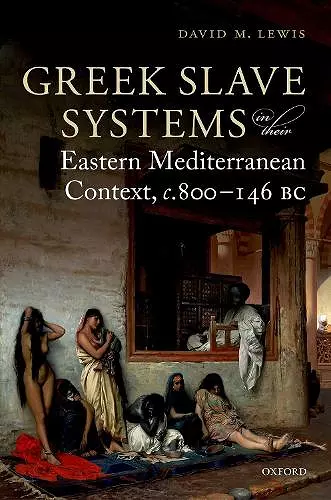Greek Slave Systems in their Eastern Mediterranean Context, c.800-146 BC
Format:Hardback
Publisher:Oxford University Press
Published:10th Aug '18
Currently unavailable, and unfortunately no date known when it will be back

The orthodox view of slavery in the ancient Mediterranean holds that Greece and Rome were its only 'genuine slave societies', that is, societies in which slave labour contributed significantly to the economy and underpinned the wealth of elites. Other societies, traditionally labelled 'societies with slaves', are thought to have made little use of slave labour and therefore have been largely ignored in recent scholarship. This volume presents a radically different view of the ancient Eastern Mediterranean world, showing that elite exploitation of slave labour in Greece and the Near East shared some fundamental similarities, although the degree of elite dependence on slaves varied from region to region. Whilst slavery was indeed particularly highly developed in Greece and Rome, it was also economically entrenched in Carthage, and played a not insignificant role in the affairs of elites in Israel, Assyria, Babylonia, and Persia. The differing degrees to which Eastern Mediterranean elites exploited slave labour represents the outcome of a complex interplay between cultural, economic, political, geographical, and demographic factors. Proceeding on a regional basis, this book tracks the ways in which local conditions shaped a wide variety of Greek and Near Eastern slave systems, and how the legal architecture of slavery in individual regions was altered and adapted to accommodate these needs. The result is a nuanced exploration of the economic underpinnings of Greek elite culture that sets its reliance on slavery within a broader historical context and sheds light on the complex circumstances from which it emerged.
From its very title, David Lewis's book primes its reader for the new ground he is breaking [...] In short, L.'s book is truly a tour de force. He demonstrates the huge intellectual payoff of situating Greece in its eastern Mediterranean context, showing convincingly that slavery played a more entrenched role in a much broader range of societies than is generally thought. * Deborah Kamen, University of Washington, Seattle *
This is an important book for people interested in Classics and for those interested in the Ancient Near East...a memorable book which will be valuably read by interested readers. * Daniel C. Snell, The University of Oklahoma, Classics Ireland *
This ambitious work is the most important book to appear on slavery in the field of ancient Greek history for many years. * William Mack, University of Birmingham, Journal of Global Slavery *
Lewis's monograph raises many complex questions . . . that will continue to provoke and inspire historians of slavery for many years to come. The book is all meat and no filler and is clearly written throughout. It is an important book and a valuable contribution to the field. * Peter Hunt, University of Colorado Boulder, Phoenix *
This is the most important contribution to our understanding of Greek slavery since the volume of essays, Slavery in Classical Antiquity: Views and Controversies, put together by Moses Finley in 1960. All subsequent discussions of Greek slavery will have to start from L.'s book. * Robin Osborne, Classics for All *
[I]t opens a new path to analyse Greek slavery. . . . [It] will certainly become a necessary landmark in the scholarship on ancient slavery, and it is difficult to summarise its merits in a short space. It not only enlarges our knowledge of Greek and Near Eastern slaveries, but it also traces guidelines for future research about the Roman slave system, in the long term, in its Mediterranean context and in all its regional diversity. * Fábio Duarte Joly, Universidade Federal de Ouro Preto, Brazil, The Classical Review *
This ambitious work is the most important book to appear on slavery in the field of ancient Greek history for many years. * William Mack, University of Birmingham, Journal of Global Slavery *
While previous scholarship assumed that slavery in the Near East was marginal, Lewis shows that slaves constituted a major part of elite portfolios in many of these societies. This has revolutionary implications for the comparative study of Mediterranean and Near Eastern history in antiquity. * Kostas Vlassopoulos, University of Crete, Greece & Rome *
ISBN: 9780198769941
Dimensions: 241mm x 163mm x 28mm
Weight: 742g
384 pages